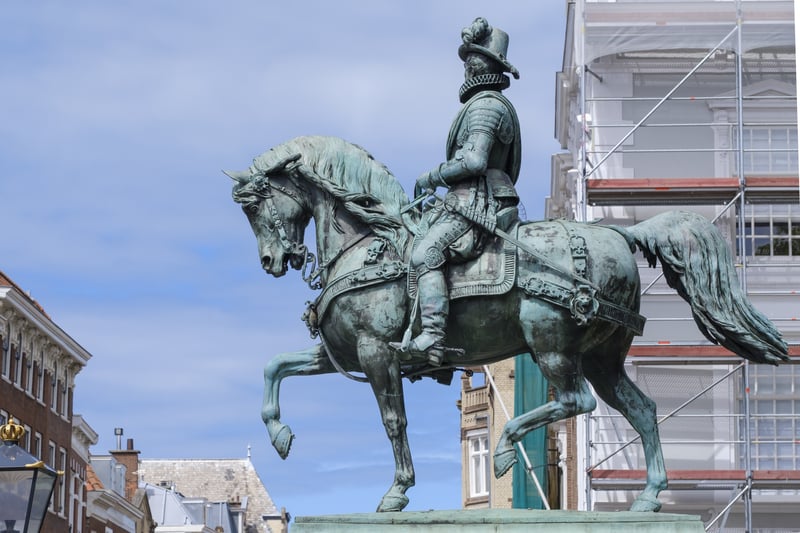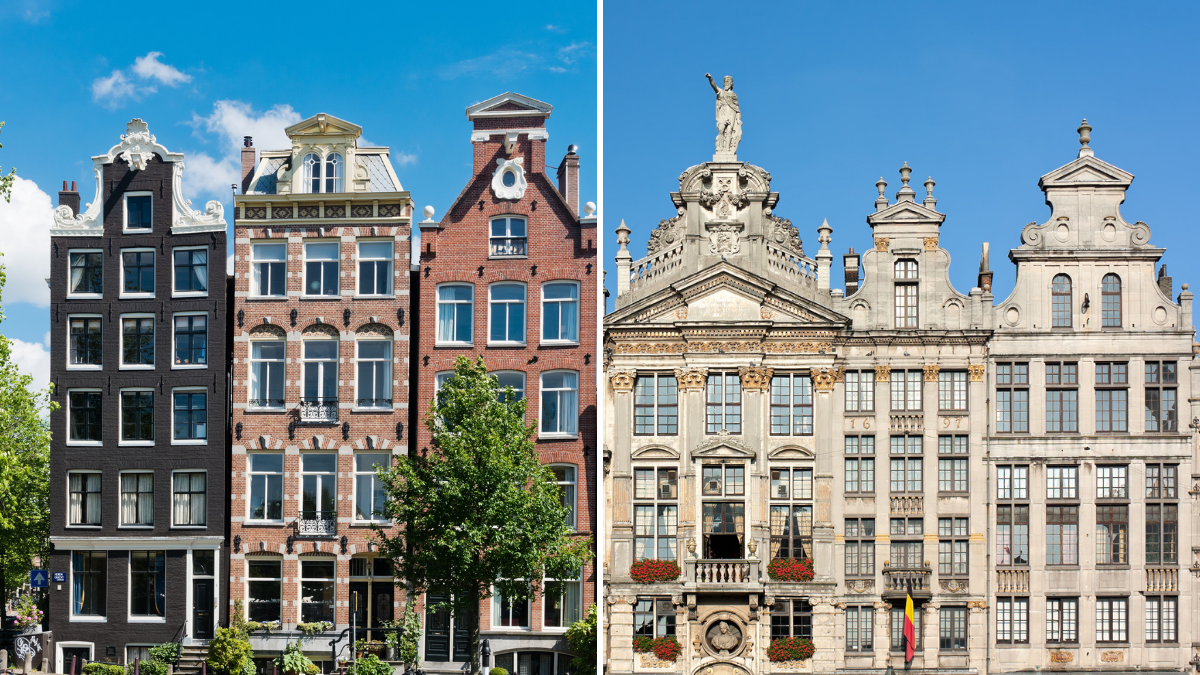You know that annoying sibling that you kind of hate but also absolutely love? Well, it turns out that same sentiment can apply to countries too.
If you’ve lived in the Netherlands for long enough, you’ve probably noticed this same love-hate relationship playing out between the Dutch and the Belgians!
Of course, a bit of friendly rivalry between countries isn’t unheard of (as a Dane, I’m looking at you, Sweden). But the question remains: why do two countries that share more than a few similarities — including a language — dislike each other so much?
Ultimately, it comes down to history, religion, and fries.
Shared history
Before getting down to the most important reason (fries, of course 😉), let’s have a look at some history.

The Southern Netherlands, *cough cough* I mean…Belgium
The shared history between the Netherlands and Belgium started way back in 1815. After the fall of Napoleon, the Congress of Vienna was charged with the tricky job of creating a balance of powers in Europe.
In an attempt to make neither France nor Prussia too strong, the area previously known as the Austrian Netherlands (hint: Belgium) was given to the newly founded United Kingdom of the Netherlands.
READ MORE | Amsterdam vs. London: a comparison of two capitals
For the coming decades, the new ‘Southern Netherlands’ was ruled under Prince Willem I — known widely as William of Orange.
Though we now thank him for the orange-mania that occasionally sweeps across the Netherlands of today, the Southern Nederlanders were not fans of the prince (nor his taxation policies or religious intolerance).
So, as was the custom in the 18th and 19th centuries, the people revolted in 1830.
The Belgian revolution
The revolution in itself was relatively short-lived.
By October 1830, revolutionaries had set up a provisional government and declared an independent Belgium. Now the only task was to figure out on what basis and by whom the new country would be governed — easy peasy!
READ NEXT | What would happen if Belgium joined the Netherlands (Video inside!)
The first step was grounding the new country in law. So, in February 1831, a Belgian constitution was adopted which declared Belgium to be a popular, constitutional monarchy.
After setting up to be a constitutional monarchy, the next step was to find a king (who was neither too Dutch nor too French 😅). Finally, on July 21, King Leopold took the throne, and the revolution was officially seen as complete.
Tadaaa! An independent Belgium…
‘So what?’
That was pretty much William of Orange’s response after the Belgians declared their independence.
In fact, he continued to wage war against the newfound country until the French said non more and intervened on the side of Belgium. William of Orange also refused to recognise the country until April 1839 — when he was forced to by the Treaty of London.
READ MORE | Dutch history hacked: 2500 years of Dutch life in 7 minutes (VIDEO INSIDE)
In short, Dutch-Belgian relations didn’t get off to a great start, but thankfully time has mended the shaky beginnings.
Today, international relations between the Netherlands and Belgium are strong — both countries are part of NATO, the EU, and the Benelux. Together, they’ve also created the Dutch Language Union.
However, just because the two countries enjoy a healthy relationship nowadays doesn’t mean history is forgotten. So, with a humorous nod to the tumultuous past, the Dutch and Belgian (still) love to hate each other.
What do the Dutch think of the Belgians?
Now that we’ve covered history, it’s time to talk about fries!
One of the dividing lines between the Netherlands and Belgium is whether fries should be called frietjes or patatjes. While (most) of the Dutch argue for friet, the Belgians are adamant patat fans.
Interesting as it may be, the Dutch and Belgian bantering does not end with this debate — in fact, there are a number of things the Dutch hold against the Belgians (and vice versa).
The Dutch hate Belgian roads
Firstly, the Dutch like to look down on the Belgians — especially their roads.
Venturing on a road trip to Belgium together with a Dutchie, you can expect at least a few comments about how the Belgian roads are “weird,” “bad,” etc.
While the intensity of comments will no doubt depend on the Dutchie you’re driving with, there’s actually something concrete to say about the difference in road quality!
In 2019, the World Economic Forum rated the Netherlands a 6.4 out of seven for their road quality, while Belgium only landed a 4.4.
The Dutch love to make fun of Flemish
Of course, Dutchies can’t leave it at roads alone. Something also has to be said about their “shared” language.
While Dutch is used in both countries, the Dutch spoken in Belgium is quite different — and the Dutch speakers from the Netherlands love to make fun of Flemish.
However, while they might make fun of it, many also think it sounds cute.
This could be because the Flemish pronounce the letter ‘g’ much softer than Dutch speakers — so if you’re struggling with the strong guttural ‘g’ sound in the Netherlands, be consoled that maybe you just sound Belgian. 😆
READ MORE | Going global: speaking Dutch (Flemish?) in Belgium
Other distinctions between Flemish and Dutch can be thought of as similar to the differences English speakers notice between British English and American English — pronunciation and some vocabulary sometimes differs.
The Dutch think Belgians are dumb
Ask a Dutch person about the Belgians, and you’ll most likely also hear that the Belgians are “dumb.”
Why? Honestly, I still haven’t figured it out (and I don’t think the Dutch really know either 😂), but most likely, it comes down to a good-natured sense of superiority.
Perhaps, it could also be the shadow of a grudge left from the Belgian revolution in 1830.
Or simply that the Dutch think Belgian governance would’ve been better off if the country had remained a part of the Netherlands rather than becoming a country with three different language regions.
Whatever the reason, it’s all in good sport, and the reality is that the average national IQ between the Netherlands and Belgium only differs by three points.
And whether or not that’s why Dutch people call Belgians dumb, one thing is for sure: the Dutch like to think their government is better organised, more efficient, and richer. (At least, that was until the governmental scandals in the past years — oopsies.)
What do the Belgians think of the Dutch?
That’s a lot of shade thrown towards the Belgians, so let’s see what they have to say about the Dutch.
The Belgians think the Dutch are stingy
Firstly, they agree with the rest of the world that the Dutch are stingy — because why pass up on a good stereotype, right? Certainly, the saying “going Dutch” is well-used around the world and could have a great deal to do with the stereotype.
READ MORE | 14 downright stingy things Dutch people do
And it’s not completely unfounded — just consider all those two euros Tikkie requests. However, the Dutch are not as stingy as they are frugal.
The difference is one of mindset.
Firstly, the Dutch are very Calvinist in nature, an ethos that played an important role in the shaping of Dutch identity throughout history — and contributed to making the Netherlands a rich country.
But the Calvinist tradition in the Netherlands is not all there is to a frugal mindset. Dutchies today also get more satisfaction from saving their money than people from other countries with similar economies.
Dutchies don’t (necessarily) go cheap because they are stingy, but because they firmly believe in the importance of living within your means and saving up for old age.
The Belgians think the Dutch are stubborn and arrogant
There’s also a notion among Belgians that the Dutch are arrogant and stubborn.
Mostly, this is the outcome of Dutch directness: something that doesn’t always go down well in Belgium, which is much more conservative.

The Belgians think of the Dutch as “cheeseheads”
Finally, it’s also not unheard of in Belgium to hear the Dutch being referred to as “cheeseheads.”
You might think the nickname makes sense considering that the Netherlands is world-famous for its cheese production and because a Dutch lunch would be incomplete without a cheese boterham.
READ MORE | The time Dutchies used cheese to defend themselves against the French
However, the explanation is much more interesting than this!
In fact, it’s thought that “cheeseheads” doesn’t refer to the Dutchies’ ability to produce the golden lactose goodness but to wearing helmets made from actual cheese vats. Yup, you heard that right.
During the time of Napoleon, Dutch cheese producers became fed up with French soldiers who’d steal their beloved Gouda.
In order to protect themselves when confronting the soldiers, Dutch farmers donned homemade helmets made from cheese barrels — et voila, cheeseheads!
Perhaps picking it up from the French, the Belgians then used “cheeseheads” as an insult during the Revolution.
You might have noticed that the Netherlands had a bit more to say about Belgium than the other way around but, as in all sibling-like relationships, one is always the bigger bully. 😉
Have you noticed any other aspects of this love-hate relationship between the Netherlands and Belgium? Tell us in the comments below!
(Except for the headline, this story has not been edited by PostX News and is published from a syndicated feed.)

